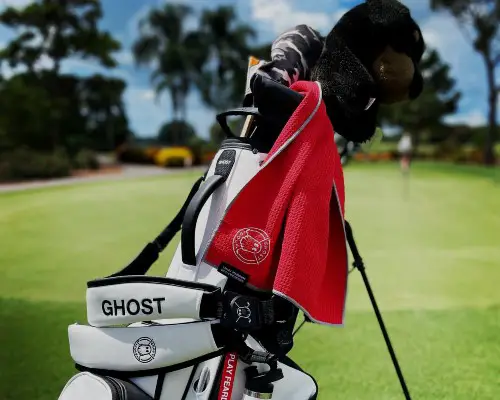
Suddenly struggling with your golf game? It’s not just you! Many golfers experience this frustrating slump.
It can be due to various reasons like technical flaws, mental barriers, or even equipment issues.
Let’s dive into the details, uncovering why your game has taken a hit and how to get back on track. Ready to improve your swing? Let’s get started
Common Reasons for a Sudden Decline in Golf Performance
1. Technical Issues Affecting Your Golf Game
1. Incorrect Ball Position
Improper ball position affects shot accuracy. Place the ball forward for drivers. Midway for irons. Back for wedges. Consistent positioning aids in solid contact. Practice with alignment sticks to ensure correct positioning.
2. Swinging Too Hard
Over-swinging leads to loss of control. Maintain a steady tempo for better accuracy. Golf is about timing, not force. Professional golfers emphasize smooth, controlled swings for consistency.
3. Grip Inconsistencies
An inconsistent grip disrupts swing mechanics. Ensure a neutral grip. Check your grip pressure frequently. Seek professional advice if needed. Consistent grip leads to better shots.
2. Physical Factors to Consider
1. Lack of Flexibility and Balance
Flexibility and balance are crucial. Regular stretching improves range of motion. Balance exercises enhance stability. Incorporate yoga or Pilates into your routine. Flexibility aids in a smoother swing.
2. Core Strength and Endurance

A strong core provides stability. Exercises like planks and medicine ball twists help. Endurance is essential for long games. Regular cardio improves stamina. Strength training supports better swing control.
3. Vision Problems
Clear vision is vital. Poor eyesight affects hand-eye coordination.
Use sports-specific eyewear if needed. Regular eye check-ups are recommended. Proper vision ensures better focus on the ball.
3. Mental and Emotional Barriers
1. Overthinking and Paralysis by Analysis
Overanalyzing disrupts natural play. Trust your training. Develop a simple pre-shot routine. Focus on execution, not perfection. Simplifying thoughts can improve performance
2. Anxiety and Lack of Confidence
Anxiety affects concentration. Practice mindfulness to stay calm. Build confidence through consistent practice.
Set small, achievable goals. Mental strength is as important as physical skill.
3. Loss of Passion and Motivation
Lack of motivation impacts performance. Rediscover your love for golf. Play casual rounds with friends. Set new, exciting goals. Enjoyment of the game boosts overall performance
Ensure You’re Using the Right Golf Gear!
1. Checking Your Golf Clubs
1. Worn-Out Grips
Grips wear out with use. A worn grip can cause slippage, affecting swing control. Check grips regularly for signs of wear. Replace them when they lose tackiness. Fresh grips improve your hold and consistency.
2. Incorrect Club Selection
Using the wrong club impacts performance. Each club serves a specific purpose. Ensure you’re using the right club for each shot. Match your clubs to your swing style. Consult with a pro for guidance.
3. Importance of Regular Equipment Maintenance

Maintaining your clubs is essential. Clean clubs perform better. Inspect them for damage regularly. Keep your clubs in good condition for consistent performance. Routine maintenance extends their lifespan.
2. Impact of Using Inappropriate Gear
1. Custom Fitting Your Clubs
Custom fitting ensures clubs match your swing. Ill-fitted clubs can harm your game. Get fitted by a professional. Proper fitting enhances control and accuracy. It’s a small investment for significant improvements.
2. Regularly Updating Your Golf Balls
Old balls lose performance. Fresh balls offer better control and distance. Replace them regularly. Choose balls suited to your playing style. This simple change can boost your game significantly
Course and Environmental Factors for Terrible Golf Performance
1. Playing in Different Weather Conditions
Weather impacts your golf game significantly. Wind changes ball trajectory. Rain affects grip and ball roll. Adapt your strategy to conditions. For example, in windy weather, lower your ball flight. In rain, use rain gloves and adjust your grip. Practice in various conditions to improve adaptability.
2. Understanding Course Changes
Courses change over time. New hazards or altered greens affect play. Stay updated on course modifications. Walk the course before playing. Note any new challenges. Adjust your game plan accordingly. This helps in maintaining performance despite changes.
3. Managing Distractions and Noise
Golf requires focus. Noise and distractions can disrupt concentration. Develop a pre-shot routine. It helps block out distractions. Practice mindfulness techniques. Stay calm and focused. This improves shot accuracy and overall performance
Practical Steps to Improve Your Golf Game

1. Refining Your Technique
1. Slowing Down Your Swing Tempo
A slower tempo improves control. Rushing your swing leads to errors. Professional golfers often use a smooth, steady pace. Practice slowing down. It helps with accuracy and consistency.
2. Practicing Proper Alignment and Stance
Alignment affects shot direction. Ensure feet, hips, and shoulders are parallel to the target line. Check your stance regularly. Proper alignment leads to better shots. Use alignment sticks for practice.
3. Using Video Feedback for Swing Analysis
Video helps identify flaws. Record your swing from different angles. Analyze it with a coach. Look for inconsistencies. Video feedback accelerates improvement by providing visual proof of what needs fixing.
2. Effective Practice Strategies
1. Developing a Structured Practice Routine
Consistency requires structured practice. Plan sessions focusing on different aspects. Include full swing, short game, and putting. Track progress. A structured routine builds muscle memory.
2. Incorporating Short Game Drills
Short game impacts overall score. Practice chipping, pitching, and putting. Spend at least 50% of practice time on the short game. Use drills to improve accuracy. This reduces strokes on the course.
3. Utilizing Mental Training Techniques
Mental strength is key in golf. Practice mindfulness and visualization. Develop a pre-shot routine. Focus on the process, not the outcome. Mental training improves focus and reduces anxiety.
3. Enhancing Physical Fitness for Golf
Stretching and Flexibility Exercises
Flexibility prevents injuries. Stretch before and after playing. Focus on shoulders, hips, and back. Regular stretching improves swing range. Yoga and Pilates are beneficial.
Core Strengthening Workouts
A strong core stabilizes your swing. Incorporate planks, twists, and crunches. Core strength enhances power and control. Aim for at least three sessions per week. This builds a solid foundation for your swing.

Cardiovascular Training for Endurance
Golf requires stamina. Cardio exercises like running, cycling, or swimming boost endurance.
Aim for 30 minutes, three times a week. Better endurance means less fatigue and better performance on the course.
By focusing on these practical steps, you can significantly improve your golf game and enjoy more consistent performance on the course.
Final Thoughts!
Sudden poor performance in golf can stem from overlooked aspects like mental and emotional barriers. Overthinking, anxiety, and loss of passion disrupt your game.
Address technical issues by refining technique and maintaining equipment. Physical fitness and consistent practice also play crucial roles.
Understanding these factors helps you regain your form. Share your experiences or ask questions in the comments. Your insights might help others facing the same issue.
FAQs
Can I Improve my Golf Swing on my own?
Yes, you can improve your golf swing on your own with dedication and the right approach. Focus on proper alignment, consistent practice, and use video feedback to analyze your swing. Additionally, consider using online tutorials and golf swing apps for guidance. Regularly practicing with these tools can help you make significant improvements.
Does Physical Fitness affect Golf performance?
Yes, physical fitness significantly affects golf performance. A strong core, good flexibility, and overall endurance enhance swing control, power, and consistency. Regular cardio, strength training, and stretching exercises can improve your game by increasing stamina and reducing fatigue on the course.
Is it normal to have Slumps in Golf?
Yes, it is normal to have slumps in golf. Many golfers, including professionals, experience periods of poor performance due to factors like changes in technique, mental barriers, or physical issues. These slumps are a part of the game and can be overcome with focused practice and adjustments.

Callum is a former professional golfer with over 20 years of experience on the course. He has won numerous tournaments and has a wealth of knowledge about the sport. Callum is our Lead Swing Coach and provides tips and advice on everything from swing mechanics to mental preparation for tournaments. Join Our Team!
